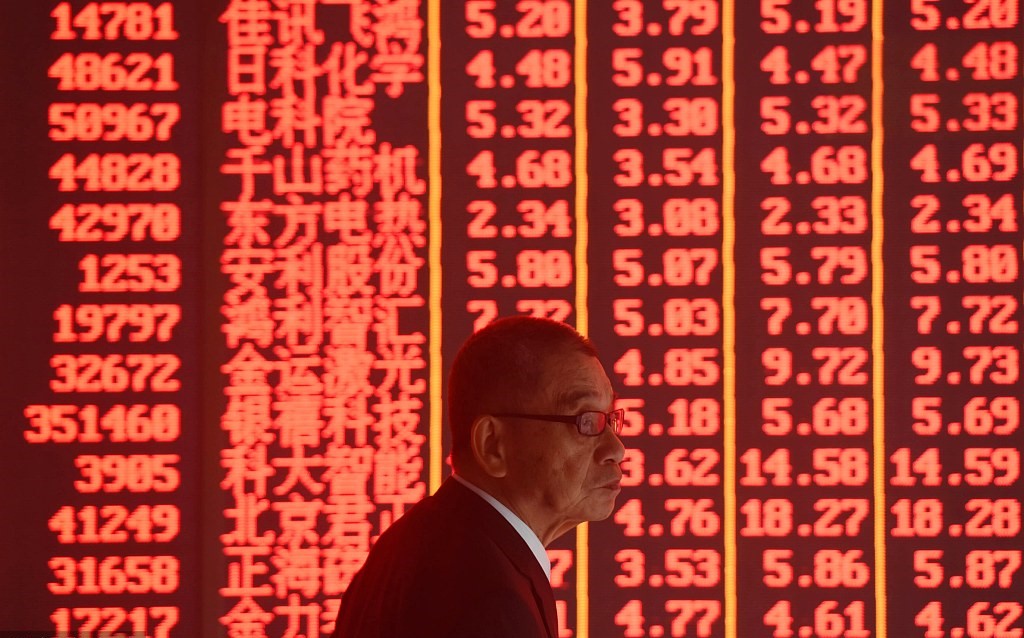
CNN reports: "China's beaten-down stock market had its best day in more than two and and a half years on Monday. The benchmark Shanghai Composite index surged more than 4% after a rare concerted intervention by senior officials to talk up the country's struggling economy and markets. China is one of the world's worst performing stock markets this year. The Shanghai index is down more than 25% since late January, hurt by fears about the economy and the impact of the trade war with the United States. But investors have been re-energized by a recent attempt by top Chinese economic and financial officials to ease investors' concerns. 'It's rare to see officials make this kind of public comment on the stock market,' said Dickie Wong, head of research at Hong Kong-based stock broker Kingston Financial. 'It's definitely boosting market sentiment.' Monday's 4.1% jump, the biggest since March 2016, brings the Shanghai index's gains to nearly 7% over the past two days of trading. On Friday, central bank chief Yi Gang said that the recent slump in the stock market didn't reflect the state of the economy, which he described as 'moving forward' in a stable manner."
Business Insider reports: "US President Donald Trump has no intention of de-escalating trade tensions with China, according to Axios citing three unnamed sources with knowledge of his private conversations, believing instead that more time is required to make 'Chinese leaders to feel more pain from his tariffs'. According to Axios, one source told them that Trump 'wants them to suffer more' from tariffs, adopting the view that the longer his tariffs last, the more leverage he'll have in trade negotiations. The US government has already introduced tariffs ranging from between 10% to 25% on $250 billion worth of Chinese goods entering the United States, triggering similar tariffs introduced by Chinese policymakers on US goods entering the nation, albeit on a smaller scale. Another source told Axios that tit-for-tat trade war is only at the 'beginning of the beginning,' suggesting there was unlikely to be a resolution despite the prospect of a meeting between Trump and Chinese President Xi on the sidelines of the G20 summit in Buenos Aires in November."
The Wall Street Journal reports: "The world's longest sea bridge is set to open on Tuesday, snaking 34 miles across China's Pearl River estuary to form a pillar of Beijing's plan to merge 11 cities in its southern region into one megalopolis. At 20 times the length of California's Golden Gate Bridge, the six-lane crossing will link a regional economic zone of 70 million people, with a combined annual GDP of $1.51 trillion—almost twice that of the San Francisco Bay Area, and larger than the national economies of Australia, Spain or Mexico. The nine-year construction project joins a recently launched high-speed train to cut travel times and boost business ties between mainland Chinese manufacturing cities and the financial hub of Hong Kong as well as the gambling enclave of Macau. The links are part of a plan to create an integrated region that officials have dubbed the 'Greater Bay Area.' The bridge will put Hong Kong, Macau and the Chinese city of Zhuhai within an hour of each other. Emphasizing the importance of the project, President Xi Jinping will be a guest of honor at the official opening Tuesday, local media reported, citing government sources."
- 2018-10-21 China's slowing economic growth should not be a concern
- 2018-10-19 Mike Pompeo Warns Panama Against Doing Business With China
- 2018-10-18 China’s weak currency is helping it in the trade war — but Beijing doesn’t want it to fall further
- 2018-10-17 Trump Opens New Front in His Battle With China: International Shipping Image
- 2018-10-16 $6 trillion of local government debt may be lurking under the surface in China
- 2018-10-15 Blame the U.S. for the Weaker Chinese Currency
- 2018-10-14 'You tell me': China ambassador stumped on who aids Trump on trade
- 2018-10-12 China’s trade surplus with the U.S. hit a record $34.1 billion in September amid trade war
- 2018-10-11 The Trump administration is right to redefine relations with China
- 2018-10-10 In New Slap at China, U.S. Expands Power to Block Foreign Investments Image
- CNN China's battered stock market just had its best day in years
- Business Insider Trump has no intention of backing down from his trade war — and wants to see China 'feel more pain'
- The Wall Street Journal China's New 34-Mile Bridge to Link Up 70 Million People in Planned Megalopolis
- The Washington Post In China, investigations and purges become the new normal
- CNBC China state media lash out at Pompeo's advice to Latin America
- The New York Times Trump May Revive the Cold War, but China Could Change the Dynamics
- CNN China mining accident: 18 trapped in tunnel
- CNBC US and China find common ground in professional hockey, with help from a Chinese billionaire
- The Wall Street Journal U.S. Warships Transit Taiwan Strait in Defiance of China
- CNBC China stocks are popping, and history shows that means these Dow stocks should be winners
- The Washington Post Japan's prime minister, a Trump buddy, now tries to cozy up to China's president
- Bloomberg China Says U.S. Should 'Think Twice' About Leaving Missile Pact
- Fortune China Will Open the World's Longest Sea Bridge This Week. A Lot of People Are Unhappy About It
- Bloomberg China's Market Rescuers Are Saving the Wrong Targets
- Foreign Policy The Trade War Has Claimed Its First Victim
- The Diplomat The Hong Kong-Zhuhai-Macau Bridge: White Elephant in the Pearl River
- Foreign Affairs How to Avoid an Avoidable War
- Financial Times Beijing finds unlikely anti-Trump weapon in global indices
- The National Interest Why America Leaving the INF Treaty is China's New Nightmare
